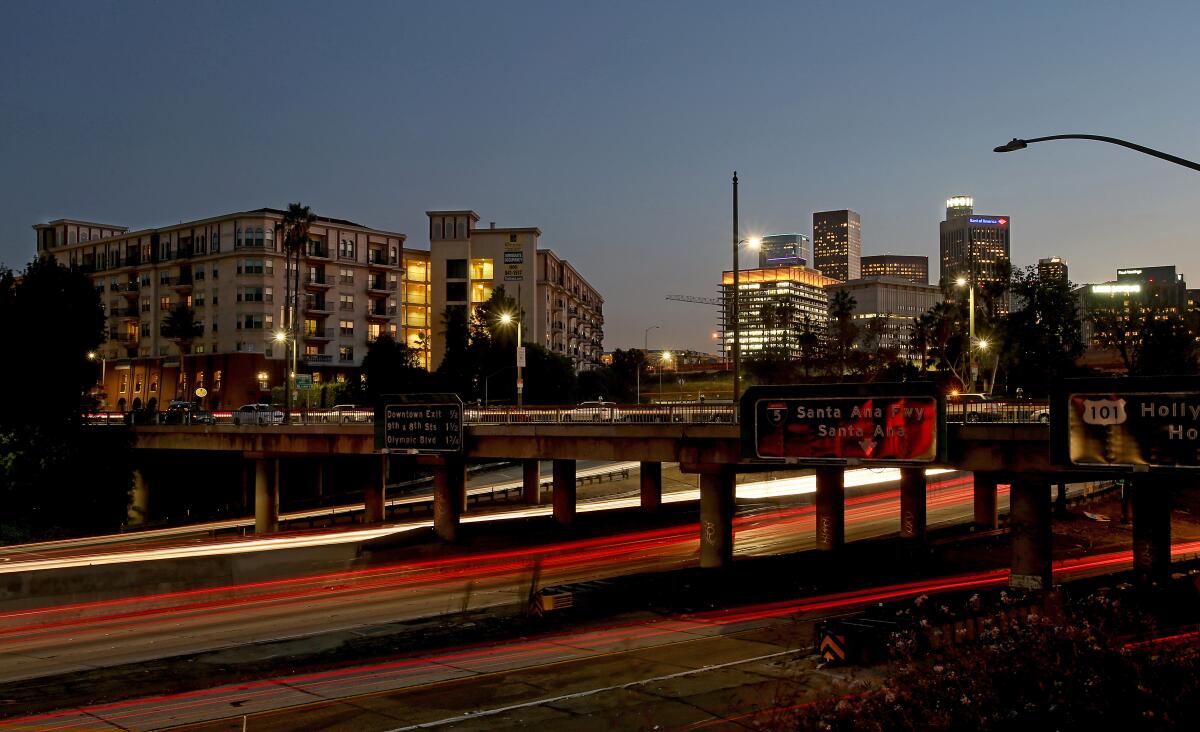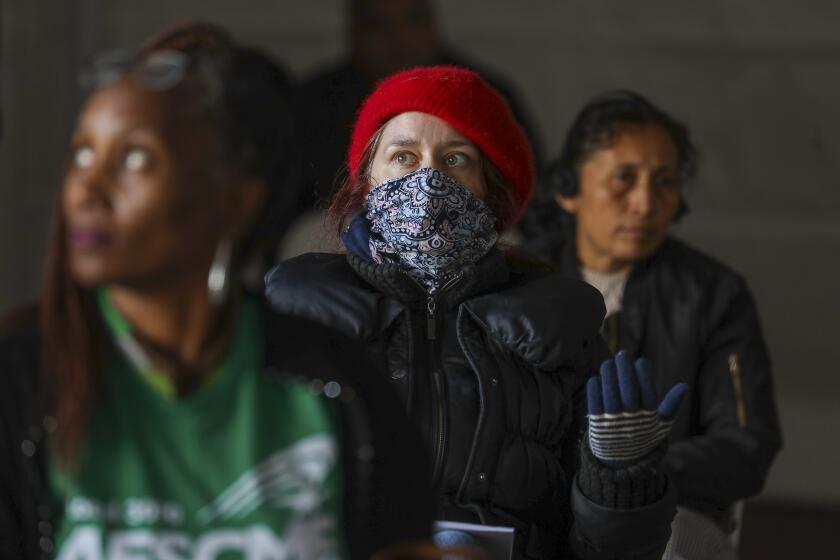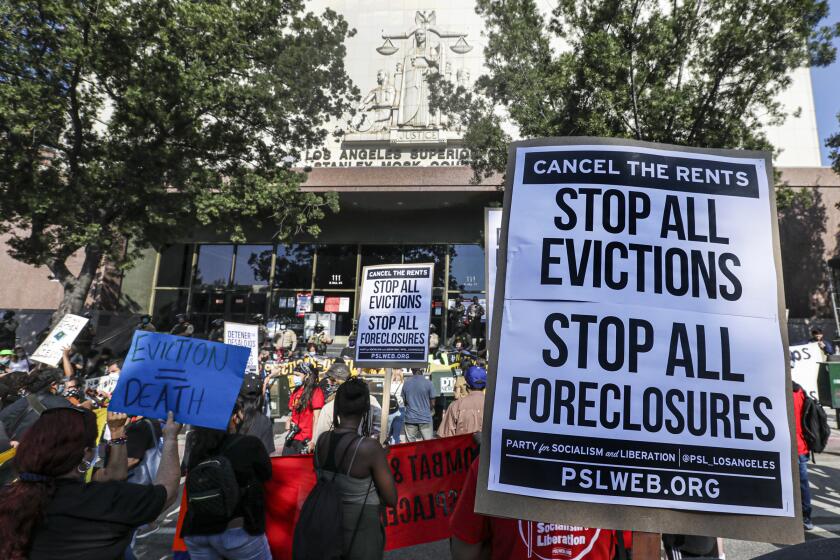Landlord sues L.A. for $100 million, saying anti-eviction law caused ‘astronomical’ losses

- Share via
One of the region’s most prolific apartment builders has sued the city of Los Angeles over its COVID-19 eviction moratorium, saying his companies have experienced “astronomical” financial losses and are legally entitled to compensation from the city.
GHP Management Corp., owned by real estate developer Geoffrey Palmer, said in its lawsuit that 12 buildings it manages have experienced more than $20 million in lost rental income as a result of the measure. GHP, which filed the lawsuit along with several other Palmer companies, expects that number to triple by the time the moratorium’s provisions have expired.
The city enacted its temporary eviction restrictions in March 2020 — just as COVID-19 was triggering business shutdowns that threw people out of work — barring building owners from forcing out tenants who could not pay rent because of hardships caused by the pandemic.
Palmer’s companies allege that the moratorium — first put in place by Mayor Eric Garcetti as an emergency order, then approved as an ordinance by the City Council — violated the “takings clause” established in the 5th Amendment, which says private property shall not be taken for public use without “just compensation.”
In a plan to protect tenants and homeowners from the coronavirus, L.A. this week ordered a ban on evictions and the creation of rental assistance fund.
Palmer’s companies said they are entitled to more than $100 million.
“While the eviction moratorium ostensibly protects tenants who are unable to pay rent due to circumstances related to the COVID-19 pandemic, it arbitrarily shifts the financial burden onto property owners, many of whom were already suffering financial hardship as a result of the pandemic and have no equivalent remedy at law,” said the lawsuit, which was filed last week.
GHP Management is a property management subsidiary of G.H. Palmer Associates, which owns more than 15,000 apartments in Southern California, according to the companies’ websites. Palmer, owner of G.H. Palmer Associates, is known for developing apartment blocks in and around downtown Los Angeles with Mediterranean features and Italian names: Medici, Lorenzo, Piero.
Asked about the filing, City Atty. Mike Feuer defended the moratorium, saying his office wrote a “lawful ordinance” that has kept tenants from becoming homeless during the pandemic.
“We defeated a previous attack on these crucial protections and will vigorously defend the ordinance again,” he said.
GHP has filed a second lawsuit over anti-eviction measures enacted by Los Angeles County and the state of California. That case seeks another $50 million and deals with apartment buildings in Santa Clarita.
The legal filings come less than two months after Gov. Gavin Newsom extended the state’s eviction moratorium until Sept. 30, offering to cover 100% of the back rent and utilities owed by many low-income residents whose finances were hurt by the COVID-19 pandemic.
Both renters and landlords may apply. Landlords seeking aid must provide information from their tenants showing that their income qualifies them for relief, according to the state’s website.
Tracy Jeanne Rosenthal, a member of the Los Angeles Tenants Union, said the state program ensures that Palmer will “receive every dollar that he is owed.” Still, Rosenthal said she does not believe he is entitled to that money.
“I am not at all convinced that his right to profit by means of passive income should take precedence over the very lives of tenants in Los Angeles whose incomes were severed by the pandemic and by public health orders that directed them to isolate and quarantine,” she said.
Rosenthal and other organizers for renters’ rights have argued that the city’s law was not a true moratorium, since it did not prohibit building owners from filing eviction cases in court. In many cases, she said, tenants simply moved out of fear instead of fighting those cases, or lost in court after failing to make a defense.
In February, city housing officials reported that they had distributed more than $98 million in subsidies to those affected by the pandemic in 2020. Of that total, 56% was paid to landlords, and 44% went directly to tenants.
Palmer is a major donor to the Republican Party and a player in local, state and national politics. So far this year, he has put at least $200,000 into the recall committee targeting Newsom and at least $110,000 into the effort to recall Los Angeles County Dist. Atty. George Gascón, according to state records.
Palmer hosted a fundraiser for President Trump in 2019 and was identified a year later as one of Trump’s top donors in California.
Larry Gross, executive director of the tenant rights group Coalition for Economic Survival, said Palmer’s lawsuit, if successful, would “wreak havoc” on the city, siphoning money from basic city services and throwing into question efforts to keep COVID-19 and homelessness under control.
“This is both an economic and a health issue to ensure that people can maintain the roofs over their heads right now,” he said.
Attorneys for Palmer’s companies did not respond to The Times’ inquiries. In their lawsuit against the city, they said the eviction moratorium had led to rent losses of more than $2.7 million at Palmer’s Medici project in downtown Los Angeles; nearly $2.8 million at the Da Vinci, a 526-unit complex along the 101/110 Freeway interchange; and nearly $3.9 million at Summit at Warner Center, an apartment property in Woodland Hills.
Because of the city’s ordinance, lenders have refused to refinance loans on properties managed by GHP, causing additional economic harm, the lawsuit said.
President Biden announced an extension of eviction moratoriums, which had expired Sunday. For California renters, protections were already in place. Here’s what you need to know about expiration dates and paying rent.
Palmer’s companies also contend that they will have little success in recouping losses from their tenants after the one-year grace period that follows the end of the city’s COVID-19 emergency.
“The city orchestrated a regulatory regime designed to provide a compulsory and de facto rent forgiveness to be foisted on landlords throughout the city,” the lawsuit states.
Palmer has tangled with the city before, persuading a three-judge panel in 2009 to strike down rules requiring developers near downtown to provide a specific percentage of affordable housing in their residential projects. The decision dealt a major setback to the city’s affordable housing efforts, said Gross, the tenant rights advocate.
“His hands are not clean in regards to the housing crisis we are now facing,” he added.
More to Read
Sign up for Essential California
The most important California stories and recommendations in your inbox every morning.
You may occasionally receive promotional content from the Los Angeles Times.













